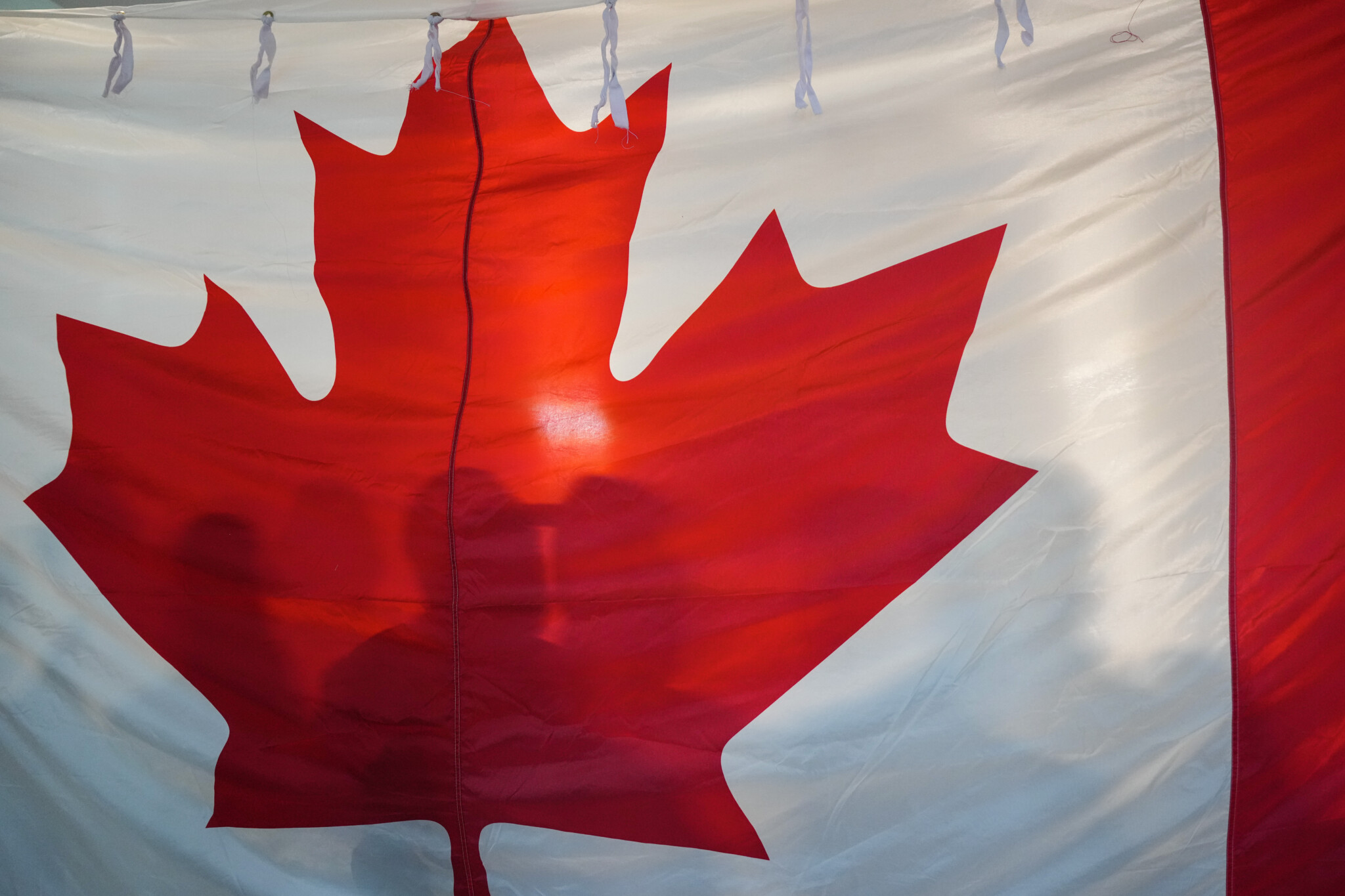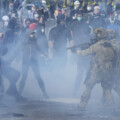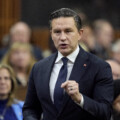
The late American-born yet Canadian-raised conservative columnist Charles Krauthammer had a gift for coining phrases that defined big ideas or moments. He attributed it to his previous life as a psychiatrist. Working in medicine, he came to understand the power of naming things.
In January 1990, Krauthammer coined a term that would come to define much of the subsequent 30 years of international affairs: the unipolar moment.
As the Cold War was winding down, it was widely assumed that the world order would move to a structure of multipolarity, with the United States becoming one among other great powers like the ascendant economic powerhouses of a reunified Germany, Japan, and the soon-to-be-formed European Union. There was also an ascendant China that was beginning to realize the wealth-generating benefits of Deng Xiaoping’s economic reforms.
Yet the much-anticipated multipolar world never came about. The dissolution of the Soviet Union instead gave rise to the U.S. as the sole global superpower, possessing unmatched military, economic, and diplomatic capabilities. The next three decades were marked by American primacy. Krauthammer was proven right.
That he saw the true nature of the coming world order and the benefits of American unipolarity to itself and others isn’t even the most insightful part of his analysis. Krauthammer also recognized that American primacy was a choice, and so too was American decline.
He would say as much in a 2009 lecture at a time when ordinary Americans were beginning to doubt the benefits of Pax Americana. Krauthammer not only contended that America’s potential decline wouldn’t be an inevitable consequence of external forces but the result of internal decisions, but he warned that such an outcome would be bad for the United States and the world. As he put it: “America is in the position of deciding whether to abdicate or retain its dominance. Decline—or continued ascendancy—is in our hands.”
Four weeks into President Trump’s second term, it seems increasingly clear that America is making its choice: it’s choosing decline.
The ideas behind this declinist bent vary a bit. But they all reach the same essential conclusion: the Trump administration’s foreign policy is about managing the end of unipolarity.
It’s hard to overstate what a shift in thinking this represents for the United States in general and among American conservatives in particular. It stands in sharp contrast to the vision of American global leadership articulated by President Ronald Reagan in the context of the Cold War. Reagan famously rejected the notion of détente in favour of American primacy and in so doing laid the intellectual groundwork for the defeat of the Soviet Union and the post-Cold War era of relative peace and prosperity.
Today there’s no prominent political voice advancing Reagan’s case for American primacy. Instead, the consensus among key figures in the Trump administration and the intellectuals in its adjacency is the overriding objective of contemporary American foreign policy is to oversee the transition to a multipolar world in which the United States is a major power but no longer a superpower. To borrow from Krauthammer, the goal is managed decline.
This understanding of the underlying assumptions and ideas of U.S. foreign policy has huge implications for Canada. It’s not just about trade irritants or even Canadian defence spending. The Trump administration’s destabilizing actions are motivated in part by a reconceptualized view of American power and its role in the world. Our policymakers must therefore begin thinking about Canadian interests in a new global order.
Reagan and the choice of American primacy
Before coming to office, Reagan famously encapsulated his foreign policy views toward the Soviet Union in the provocative statement: “My idea of American policy toward the Soviet Union is simple, and some would say simplistic. It is this: we win and they lose.”
It was seen at the time as a radical proposition. America’s Cold War policy been predicated on the theory of détente which took for granted that American primacy was neither possible nor desirable and therefore the goal of U.S. policy was to manage bipolarity. Diplomacy, arms control agreements like the Strategic Arms Limitation Talks (SALT), and different forms of economic engagement prioritized conflict avoidance over constraining the Soviet Union’s global influence.
While détente had its critics such as American neoconservatives like Norman Podhoretz, they were a small (even fringe) minority. Bipolarity was the overwhelming consensus among U.S. politicians and intellectuals. Reagan’s rejection of it in favour of the goal of primacy was thus characterized as both ignorant and dangerous. There was a sense that his provocations might turn a cold war into a hot war.
In practice, however, Reagan’s foreign policy was marked by a dual strategy of military strength and diplomatic engagement. His approach to the Soviet Union, defence spending, NATO relations, summit diplomacy, and free trade showcased a blend of ideological conviction and pragmatic restraint.
His inaugural address captured this nuance:
We will again be the exemplar of freedom and a beacon of hope for those who do not now have freedom.
To those neighbors and allies who share our freedom, we will strengthen our historic ties and assure them of our support and firm commitment. We will match loyalty with loyalty. We will strive for mutually beneficial relations. We will not use our friendship to impose on their sovereignty, for our own sovereignty is not for sale.
As for the enemies of freedom, those who are potential adversaries, they will be reminded that peace is the highest aspiration of the American people. We will negotiate for it, sacrifice for it; we will not surrender for it, now or ever.
American primacy for Reagan wasn’t simply about dominance by brute force. While military strength was key, America was also to be a shining city on a hill, a beacon of hope, and an example of freedom and prosperity to the world.
And it was even prepared to underwrite the global system of cooperation and trade among market democracies. This meant massively increasing U.S. military spending, accepting disproportionate responsibility for the financing of international institutions, and restraining the use of its asymmetric economic power in its trade and investment relationships with key allies. American commentator Oren Cass has described U.S. policy during the Reagan era and the decades to follow as one of a “benign hegemon.”
Free trade in particular has been a key part of this period of American global leadership. It’s fair to say that the 1987 Canada-U.S. Free Trade Agreement was a formative step in a broader trend towards liberalized trade and the rise of post-Cold War globalization. Reagan saw the free exchange of capital and goods as integral to both economic growth and global stability.
As he said at the signing of the Canada-U.S. free trade agreement:
We must make sure the freedoms we enjoy include the freedom to choose at home and the freedom to be chosen abroad. This nation, which was born to nurture human freedoms, must take the lead in establishing the principle that one of the most important human freedoms is free exchange.
Although there were some conservative critics of Reagan’s vision of U.S. global leadership, his case for American primacy came to dominate the Republican Party and the broader conservative movement. It also influenced policy thinking inside the Democratic Party such that the transition across successive administrations involved a high degree of continuity on free trade, globalization, and America’s indispensable role in the world. If Reagan laid the foundation for post-Cold War globalization, it was the Clinton and two separate Bush administrations that gave it expression.
Trump and the embrace of American decline
It’s difficult to precisely assess when the political consensus in favour of American primacy started to unwind. The perceived failures in Afghanistan and Iraq are part of the story. So is the global financial crisis and the growing sense that the system of globalized investment and trade flows was doing harm to large numbers of ordinary Americans. And of course there’s the rise of China and its own economic and geopolitical ambitions.
Whenever it first started and whatever the confluence of factors that have contributed to its congealing, a new consensus—particularly on the American Right—has taken shape against the purported benefits of unipolarity or even the United States’s capacity to sustain it.
There’s a strong sense that the globalized system that emerged in the post-Cold War era has worked for other countries at the expense of the United States and that a unilateral withdrawal from superpower status is both a more realistic understanding of today’s global landscape and ultimately more advantageous to America itself.
Trump’s “America First” foreign policy may be an erratic and obnoxious expression of this line of thinking but it would be wrong to assume that it’s merely a reflection of the president’s own capricious impulses. It’s part of a broader school of thought that sees the purpose of contemporary U.S. foreign policy as managing the transition from American primacy to multipolarity. In practice, this means a narrower yet firmer conception of U.S. national interests, the use of its economic and military power as bilateral leverage, and a departure from traditional multilateral engagements.
Now, this doesn’t mean the Trump administration won’t occasionally diverge from these basic insights. The president’s own excesses will no doubt lead to actions and rhetoric—like Trump’s musings about the U.S. acquiring Greenland, the Panama Canal, or even making Canada the 51st state—more akin to what some call “predatory isolationism.”
But we shouldn’t let Trumpian deviations distract from these broader intellectual and political currents. The routing of the “primacists” in the Republican ranks has put the party and the country on what feels like an irreversible path toward retreat.
Without a shot fired, the U.S. is abdicating its primacy. It doesn’t want to be the indispensable nation anymore. The rewards of being indispensable are seen to outweigh the costs. Instead, it’s satisfied being a major power in a bipolar or even multipower world. One almost hears a sense of relief from those who argue that America can now assume the behaviours and characteristics of more conventional powers.
This is already leading to practical shifts in American policy, including the use of tariffs as an economic weapon to extract concessions from not just adversaries like China, but also its allies like Canada; greater policy intervention in favour of domestic production and economic self-sufficiency; the withdrawal from international agreements and institutions; the cutting of U.S. humanitarian aid; and a more transactional and less values-based approach to its bilateral relations.
What’s striking about these developments is how dominant this thinking is. There are, to our knowledge, no prominent Republican voices who argue for renewing or strengthening American primacy. As New York Times columnist Ross Douthat recently set out, to the extent that there’s a debate it’s on a declinist spectrum. There are those who want to “right size” America’s place in the world and those who want to withdraw altogether. The party of Reagan has uniformly (and regrettably) chosen decline.
The world order is shifting. Where does this leave Canada?
With America in a global retreat, we’re in a period of profound international change. The world order that the United States and Canada were instrumental in building looks to be effectively dead. While the exact contours of what comes next are unclear, it appears the world is headed towards a bipolar world and perhaps a multipolar one in the future. This world will ostensibly be shaped by different forms of economic and geopolitical blocs in which transactional relations will be predominant. One can envision such a world being marked by more uncertainty and conflict than the one that predated it.
For Canada, it is time to start thinking about what comes next, both in terms of the international structure and the policies that it needs to pursue. To this end, The Hub is proud to launch a forthcoming essay series that aims to grapple with these seismic changes and offer a clear-headed direction for Canadian foreign policy.
We’ll carry out the series in the spirit of Krauthammer’s adage. As he said in his 2009 lecture: “Nothing is written. Nothing is predetermined.” The essays that we’ll publish over the coming weeks will aspire to write Canada’s policy for a new world order.









